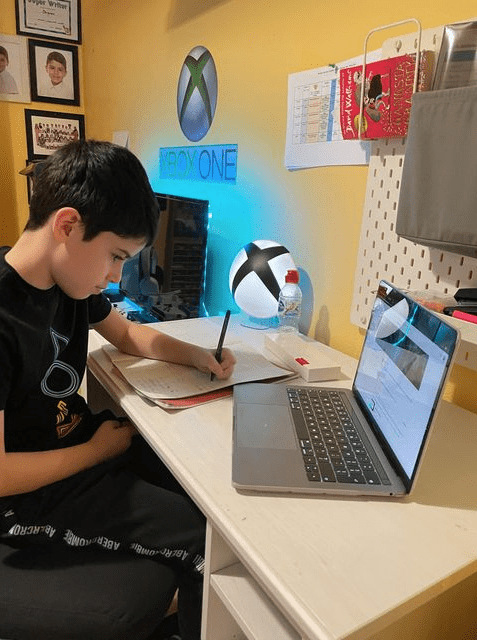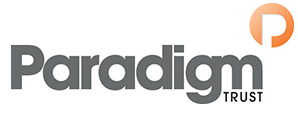Learning Through Lockdown

Clever planning, a robust pedagogy and innovative teaching methods have helped Paradigm Trust continue to provide effective education for its students during the third national Covid lockdown.
Using findings and insights from the first period of lockdown in the spring and summer term of last year, Paradigm Trust built a robust plan of action should the need to close schools and engage in remote learning arise again, for whatever reason. Preparation continued through the autumn term when schools were fully open, including training staff and pupils on how to use Google Classroom, discussing a remote learning pedagogy and planning the logistics that were necessary to be able to deliver effective teaching online to all its pupils.
So when, with barely twelve hours’ notice, the official notification that schools would be closed to all children (apart from vulnerable and key worker children) was received, Paradigm Trust were able to move swiftly to remote learning with a minimum of disruption. Thanks to the preparation made earlier, schools are now delivering a full and engaging timetable which mainly comprises either recorded lessons made by Paradigm teachers, or live lessons which follow the same structure as an in-school lesson.

One of the most significant challenges faced in the first lockdown was the ‘digital divide’, with many families unable to access the online resources available due to a lack of appropriate devices and/or a reliable internet connection with sufficient data allowance. With live lessons now an established feature at all levels of schooling it is even more important that every student has an acceptable level of access to the internet, one which permits them to participate fully in online learning.
To this end Paradigm schools have supplied more than 1900 Chromebooks to families who were having difficulties accessing remote learning online. To put that in context, the Trust educates just under 3200 pupils, with around 40% of those pupils eligible for free school meals. To help meet the challenge of unreliable or insufficient internet access the schools have also been distributing dongles preloaded with data allowance, and arranging for families to have their data cap increased by their internet provider, to ensure all pupils are able to access the same resources.
Remote learning also presents a challenge when it comes to providing pastoral support for staff and students. Indeed, being in a third lockdown is likely to exacerbate the need for support, with issues such as mental health problems becoming more prevalent, and the usual provision and support provided in schools being inaccessible in the usual places and formats.
Paradigm Trust recognises this is a serious issue and so to ensure schools can support its students effectively Paradigm has put a number of different measures in place and is regularly reviewing them to find ways in which they can be improved. It is still running interventions, though in the virtual environment rather than face to face. Specialised support staff are joining in the lessons to provide additional support to the pupils who need it, and hard-copy packs of the learning as well as practical resources to support the online curriculum are being offered. Paradigm’s inclusion teams continue to work and there is regular contact with vulnerable families. Counselling services continue to operate remotely. Where appropriate students receive welfare calls during the week to check how they are coping with school work and life in general, and provide support where necessary, and all schools are offering the voucher scheme to those families who are eligible for free meals. As it would be in normal times, all the support Paradigm provides is individualised to the needs of the pupils.
The way in which Paradigm Trust schools support their SEN pupils has also had to be adapted to work in the new circumstances. This has manifested in a variety of ways depending on the school and the requirements of the pupil. Teachers are differentiating the work on Google Classroom to meet the needs of the students, and one-to-one lessons are taking place, as are interventions and speech and language therapy sessions. We encourage vulnerable pupils to attend school on site, including all pupils with an education, health and care plan. The approach is proving effective, for example the children in the SEN unit at Murrayfield Primary Academy are flourishing, with pupils making consistently good progress despite the circumstances.
As a Trust, Paradigm has been able to use its collective resources to benefit every one of its schools. To ensure pupils have access to as broad a curriculum as possible, Paradigm Trust Pedagogy lead Ben Rogers and leaders at Ipswich Academy have mobilised the curriculum leads across all six of the schools to create bespoke, pre-recorded content across a range of primary subjects including Science, Geography, Computing, Art and Design, DT and PE.

By collaborating in this way Paradigm can ensure schools continue to deliver excellent teaching and also reduce workload on teaching staff at this high-pressure time. Staffing can be managed more efficiently and physical resources such as art equipment sets can be provided for pupils to use at home.
Paradigm Trust’s commitment to continually improving its educational offer has withstood, and even been strengthened, by the pandemic. It continues to seek the most effective ways to teach remotely, testing different innovations and then sharing those that have been proven to be effective. Opportunities to share teaching practice have been created across the Trust, so that staff can reflect on colleagues’ approaches and incorporate aspects into their own work. Everyone at Paradigm works together to deliver an effective, challenging and interesting remote learning experience for its pupils.
